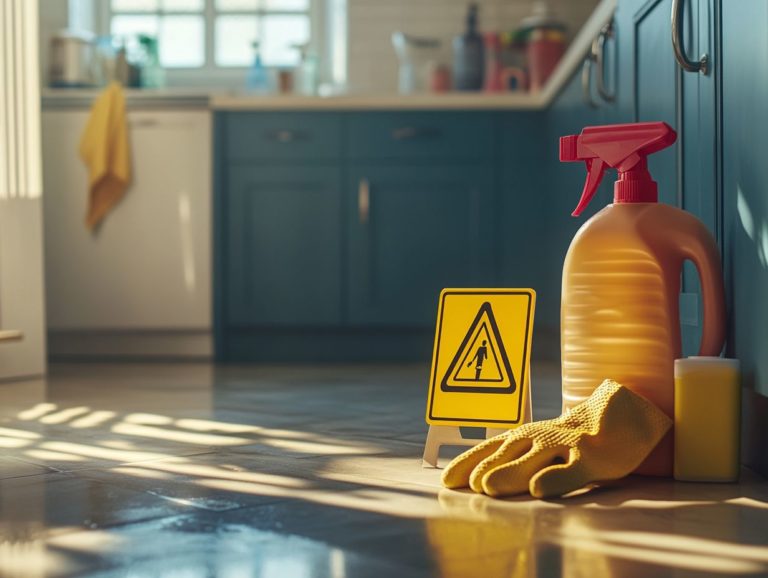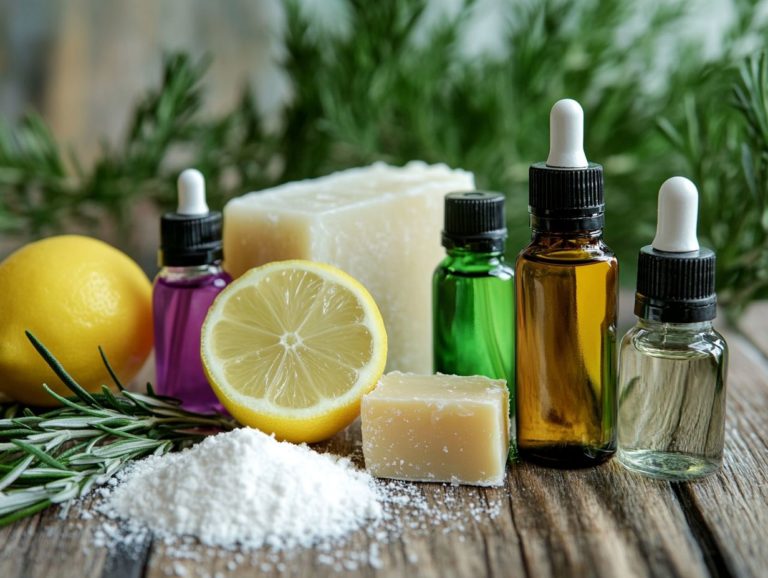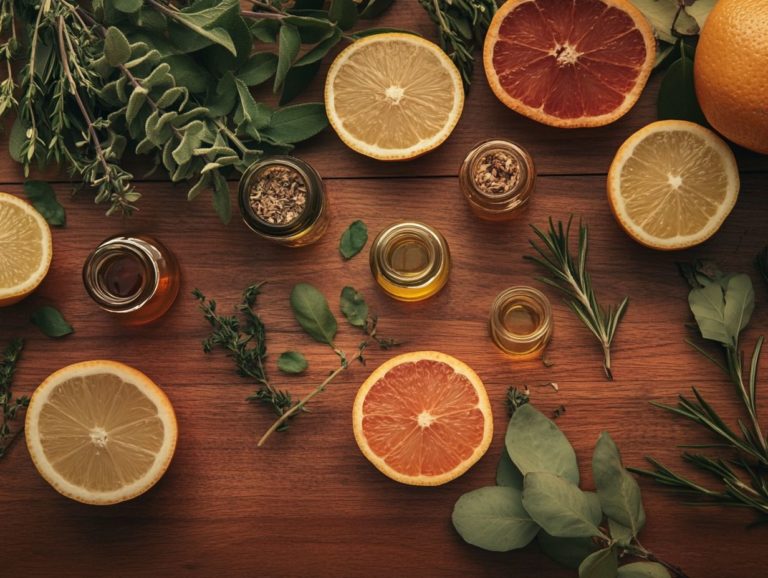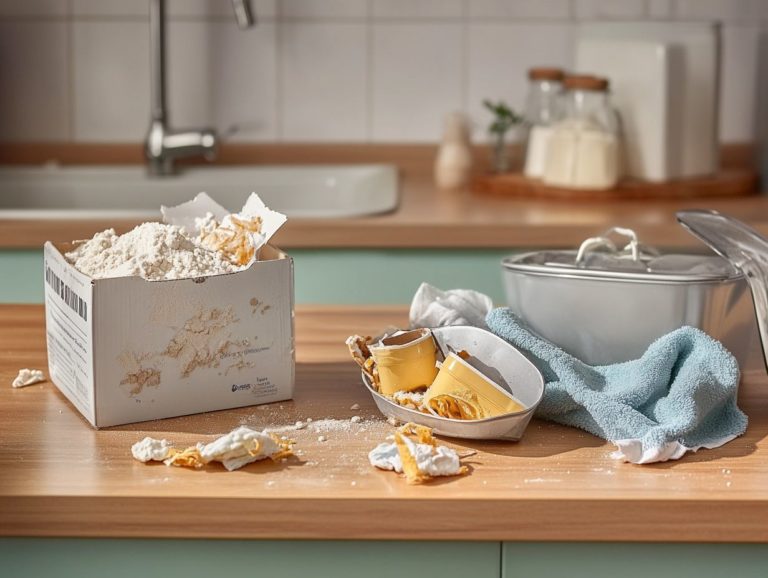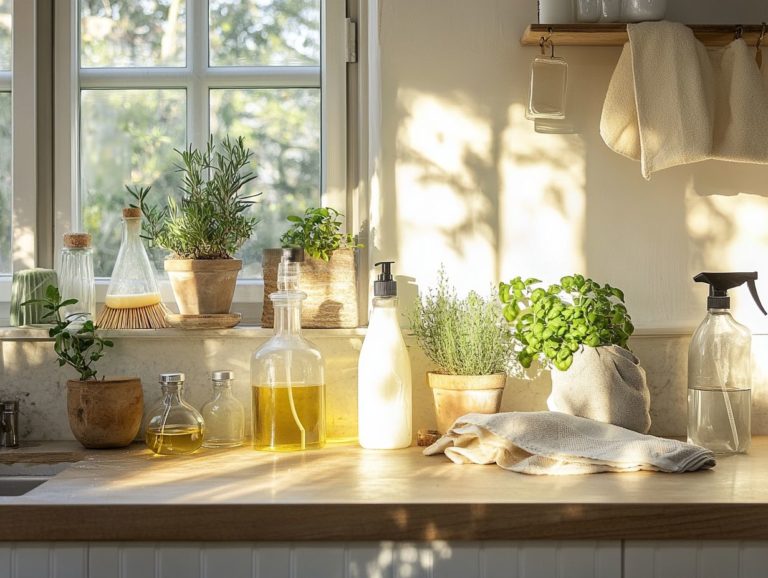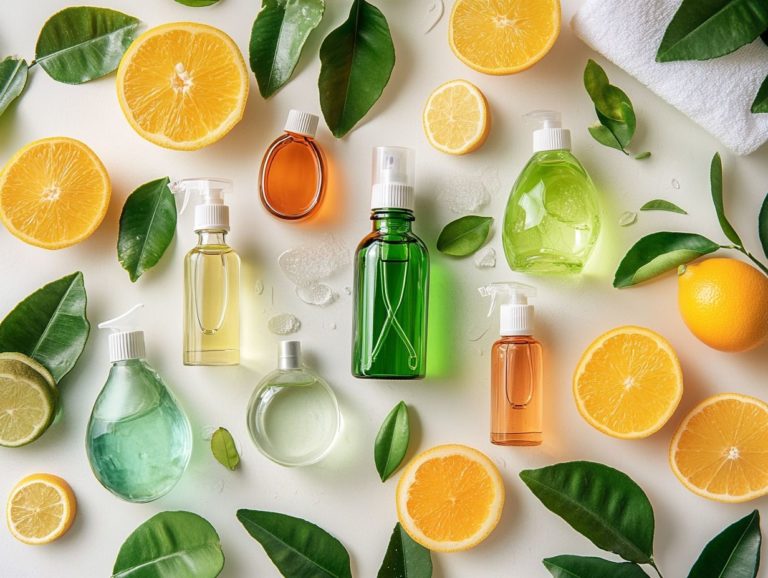The Best Natural Cleaners for Your Kitchen
In a world that is becoming increasingly conscious of health and environmental issues, natural cleaners and their antibacterial properties have risen to prominence as a preferred alternative to traditional chemical products, particularly in the kitchen.
This article delves into ten highly effective natural cleaning solutions think vinegar, baking soda, and essential oils, including eucalyptus and rosemary that not only combat grime but also foster a healthier cooking environment.
You ll discover the myriad benefits of these eco-friendly options, learn about harmful chemicals to steer clear of, and uncover tips to enhance their effectiveness.
Prepare to elevate your kitchen cleaning routine to a new level with eco-friendly products and sustainable cleaning practices!
Contents
- Key Takeaways:
- 1. Vinegar (White Vinegar)
- 2. Baking Soda
- 3. Lemon Juice
- 4. Salt
- 5. Essential Oils
- 6. Castile Soap
- 7. Hydrogen Peroxide
- 8. Citrus Peels
- 9. White Vinegar and Water Solution (with Essential Oils)
- 10. Borax
- Why Should You Use Natural Cleaners in Your Kitchen?
- What Are the Benefits of Using Natural Cleaners?
- What Are the Common Chemicals Found in Conventional Cleaners?
- How Can Natural Cleaners Be More Effective Than Chemical Cleaners?
- What Are Some Tips for Using Natural Cleaners in the Kitchen?
- What Are the Environmental Benefits of Using Natural Cleaners?
- Frequently Asked Questions
- What are the benefits of using natural cleaners in your kitchen?
- What are the best natural cleaners for disinfecting surfaces in your kitchen?
- How can I remove tough stains from my kitchen surfaces using natural cleaners?
- Are natural cleaners safe to use around children and pets?
- What are some natural cleaners that can be used to clean greasy surfaces in the kitchen?
- Can you make your own natural cleaners at home?
Key Takeaways:
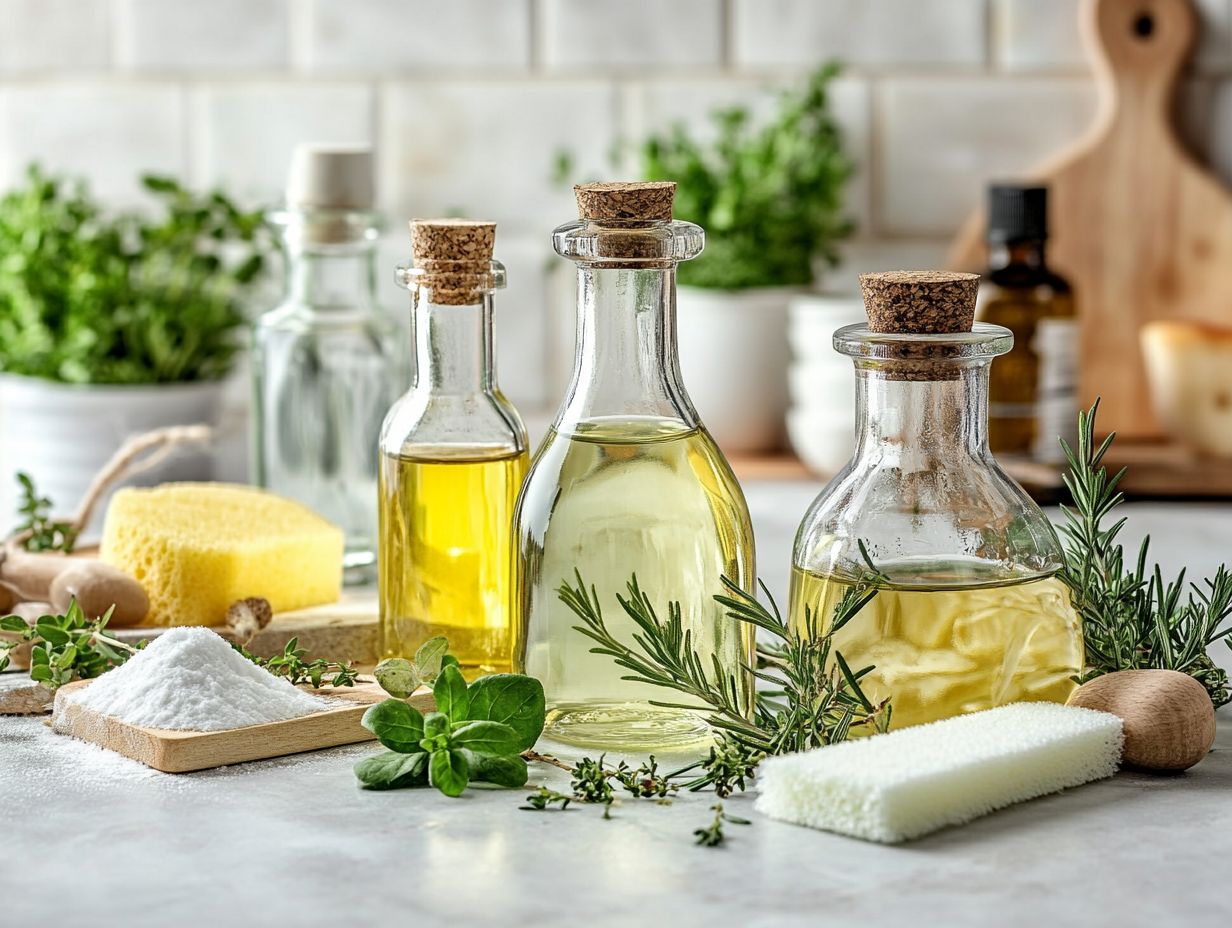
- Switching to natural cleaners can benefit both your health and the environment.
- Vinegar, baking soda, and lemon juice are versatile and effective natural cleaners for kitchen surfaces, appliances, and even floor cleaning.
- Using natural cleaners such as essential oils and citrus peels can add a pleasant scent to your kitchen while cleaning.
1. Vinegar (White Vinegar)
Vinegar, particularly white vinegar, is your go-to natural cleaner, ready to tackle a myriad of cleaning tasks around your home. From disinfecting surfaces to banishing tough stains, it s a must-have in any eco-friendly cleaning arsenal and a key ingredient in countless DIY cleaner recipes. In fact, combining it with citrus peels or essential oils like thyme can enhance its cleaning capabilities.
Its unique composition equips it to fight off a range of bacteria, including notorious strains like E. Coli, making it an excellent alternative to harsher chemical cleaners that can expose your family to harmful substances. This makes it particularly effective for cleaning countertops and kitchen sinks.
When you whip up homemade vinegar cleaner solutions, simply mix equal parts vinegar and water in a spray bottle. This concoction becomes a fantastic all-purpose cleaner for countertops, kitchen surfaces, and bathrooms. Adding a few drops of essential oils like eucalyptus or peppermint can make the solution even more potent and fragrant.
Unlike traditional cleaning products that often harbor harmful toxins capable of irritating skin and eyes, using vinegar not only creates a safer environment for you and your loved ones but also leaves behind a fresh, natural scent, elevating the overall cleanliness of your home.
2. Baking Soda
Baking soda is your go-to natural cleaner, renowned for its remarkable ability to tackle odors and stubborn stains. This essential ingredient is a cornerstone of non-toxic kitchen cleaners and a must-have in eco-friendly cleaning routines. You can find it in numerous homemade cleaner recipes recommended by health food stores.
Its versatility knows no bounds, extending to various applications throughout your home. For instance, it works wonders in deodorizing the refrigerator, absorbing unpleasant odors and ensuring your food remains fresh and inviting. Need to clean countertops? Baking soda slices through grease and grime effortlessly, all without the need for harsh chemicals.
For those persistent stains on fabrics or carpets, a simple paste of baking soda and water can work miracles, lifting marks with surprising ease. Best of all, this incredible substance is biodegradable, making it a safe choice for family-friendly cleaning. With baking soda, you can maintain a pristine environment without compromising on health or safety. This also helps you avoid chemical residue often left behind by traditional cleaning products.
3. Lemon Juice
Lemon juice is not just a zesty addition to your culinary creations; it’s also a powerful natural cleaner celebrated for its antibacterial properties and ability to cut through grease. This makes it a favored option among eco-friendly household cleaning products, especially those looking to minimize environmental impact.
When you re faced with stubborn stains, a simple mixture of lemon juice and baking soda can work wonders on countertops and fabrics alike, effortlessly lifting marks left by food and drinks. Plus, its fresh scent acts as a natural deodorizer, neutralizing unpleasant odors in your kitchen and refrigerator.
Beyond being a reliable stain remover, lemon juice effectively combats food-related bacteria, making it an excellent choice for cleaning cutting boards and utensils. Many individuals have turned to DIY cleaning solutions that incorporate lemon juice, often combining it with vinegar or water, to produce environmentally friendly sprays that leave surfaces gleaming and sanitized. Adding essential oils like bergamot or clove can further enhance these solutions.
4. Salt
Salt, a kitchen staple you likely have on hand, doubles as a remarkable natural cleaner that effortlessly banishes stains and grime, all while being a safe, nontoxic option for your household cleaning rituals. Combining salt with essential oils like lavender can make your cleaning ritual even more effective and aromatic.
Its versatility makes it ideal for an array of cleaning tasks from scrubbing surfaces in your kitchen and bathroom to deodorizing your carpets and upholstery. When you mix salt with vinegar, you create a powerful solution that cuts through stubborn grime, making it perfect for tackling those pots and pans that have seen better days. Adding a few drops of essential oils like cinnamon bark can enhance the effectiveness of this cleaning solution.
Enhancing this concoction with lemon juice takes it up a notch, as the acidity helps dissolve tough stains and brighten surfaces. Together, these natural ingredients don t just combat dirt effectively; they also leave behind a delightful, clean scent, making them an excellent choice for anyone keen on maintaining a spotless home without resorting to harsh chemicals.
5. Essential Oils
Essential oils like eucalyptus, tea tree, lavender, and rosemary do more than just fill your space with delightful aromas; they also bring valuable antibacterial properties to the table, making them essential in your homemade cleaners and a fundamental part of green cleaning practices. Brands like Young Living and doTERRA offer a wide range of essential oils that can be incorporated into your household cleaning routine.
When you incorporate these essential oils into your cleaning solutions, you elevate mundane chores into aromatic experiences, all while ensuring a safer environment for your family. Take tea tree oil, for example it’s famous for its powerful antibacterial effects, especially against the germs that love to linger on kitchen surfaces. And let s not forget lavender, which not only enchants your senses with its soothing scent but also doubles as a natural disinfectant, effectively tackling unwanted bacteria while creating a calming atmosphere.
By utilizing essential oils in your household cleaning routine, you re not just banishing harmful microbes; you re also nurturing a family-friendly space that aligns with eco-conscious living. You replace harsh chemicals with soothing, plant-based alternatives, and this commitment to a cleaner, healthier home provides peace of mind, knowing that the products you use are safe for both your loved ones and the environment. This includes using non-toxic products like Castile soap combined with essential oils.
6. Castile Soap
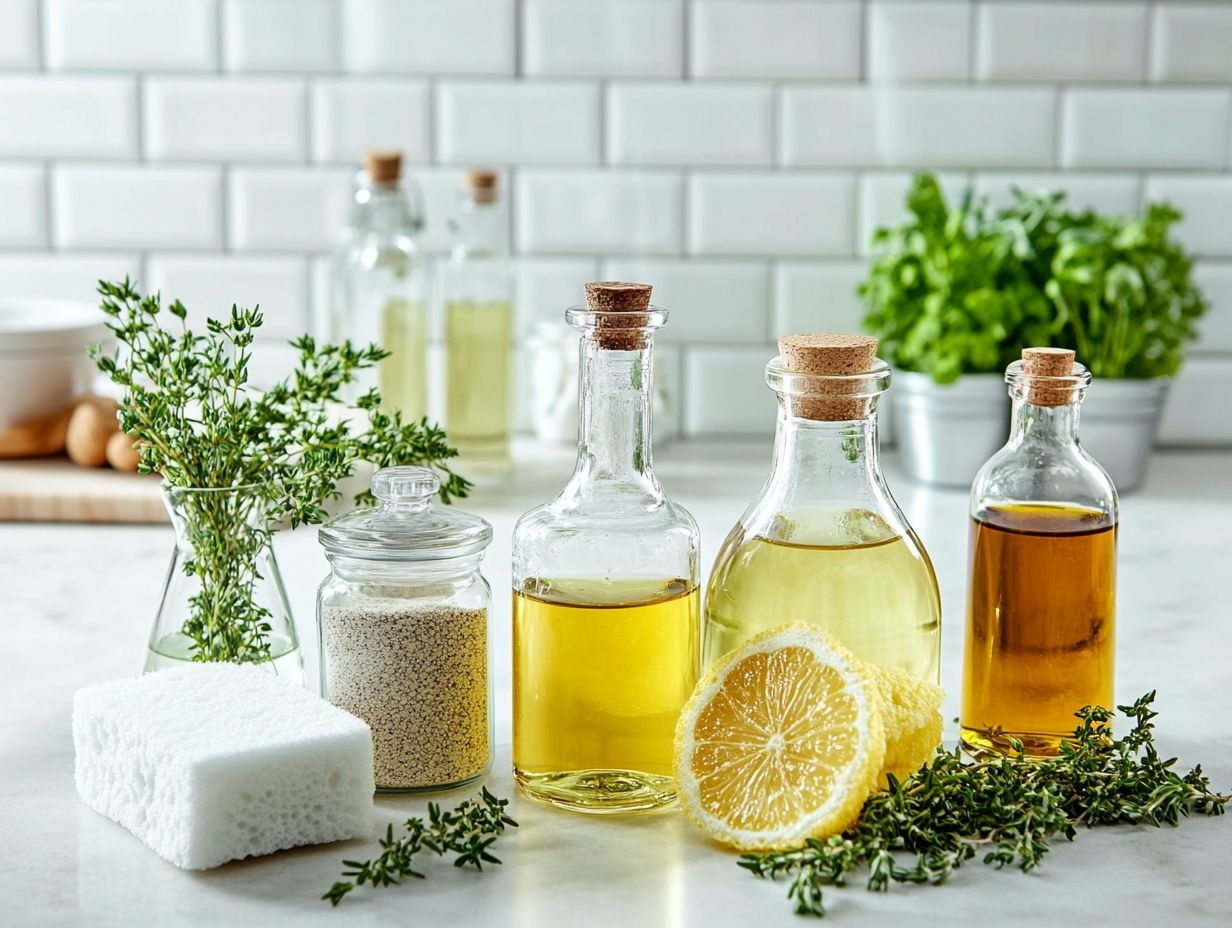
Castile soap is your go-to for a versatile and biodegradable natural cleaner crafted from vegetable oils. It s an excellent choice if you’re on the hunt for non-toxic kitchen cleaners and eco-friendly products for your household. This soap can be found in many health food stores, emphasizing its green cleaning credentials.
Its adaptability goes beyond just the kitchen; you’ll find it remarkably effective for surface cleaning throughout your home. Perfect for tackling that greasy buildup in the sink, this gentle formula cuts through messes without relying on harsh chemicals.
You can use it as a general-purpose cleaner for a variety of surfaces, from countertops to floors, thanks to its mild yet effective cleaning properties. Combining it with essential oils like oregano adds an extra layer of antibacterial protection.
Prioritizing sustainability, this soap not only delivers impressive cleaning results but also aligns beautifully with your eco-conscious choices. It promotes a healthier environment by reducing your exposure to synthetic substances and encouraging the use of biodegradable ingredients.
7. Hydrogen Peroxide
Hydrogen peroxide is a remarkable natural cleaner celebrated for its ability to kill germs and robust antibacterial properties, making it an invaluable asset in your household cleaning toolkit for health and safety. This versatile cleaner can also be used in homemade cleaner recipes that target high-touch surfaces in your home.
This solution conquers stubborn stains and serves as a potent weapon against a variety of germs, including viruses and bacteria. It s a must-have during flu season to keep your home safe!
Many people find great value in its ability to sanitize high-touch surfaces like countertops, door handles, and bathroom fixtures, fostering a cleaner and healthier living space.
Remember to prioritize safety precautions. Wearing gloves and ensuring proper ventilation can help prevent skin irritation and respiratory issues. By combining its natural disinfectant qualities with mindful usage, you can maximize the benefits without compromising your safety. This makes it an ideal component in chemical-free cleaning and DIY non-toxic cleaner solutions.
8. Citrus Peels
Citrus peels, often tossed aside, can be transformed into a remarkable natural cleaner brimming with essential oils. This eco-friendly option not only enhances your cleaning solutions but also helps reduce waste in your household routines. Incorporating them into a cleaning solution with warm dish soap can be particularly effective.
By infusing those peels in vinegar, you create a powerful cleaning solution that taps into their antibacterial properties, making it an ideal choice for disinfecting various surfaces around your home. This infusion does more than just clean; it neutralizes unpleasant odors and leaves behind a refreshing scent.
Adding a few drops of essential oils like melaleuca can further boost its antibacterial properties. Using citrus peels for scrubbing brings a delightful fragrance to the chore, effectively tackling grime and grease without resorting to harsh chemicals.
By embracing such sustainable cleaning practices, you re not just promoting a healthier living environment; you re also making strides toward reducing household waste, perfectly aligning with your eco-conscious values. This approach is highly recommended by experts like Rebecca Jones from Asheville, North Carolina.
9. White Vinegar and Water Solution (with Essential Oils)
A simple blend of white vinegar and water becomes your go-to homemade cleaner. This solution effortlessly addresses a range of household cleaning tasks while maintaining a safe, non-toxic profile suitable for family environments.
This versatile concoction is ideal for cleaning countertops. It cuts through grease and grime without leaving behind harmful residues, ensuring a safe space for food preparation. To whip up this effective cleaner, mix equal parts of water and white vinegar in a spray bottle. For stubborn stains on appliances, a few drops of dish soap can amplify the solution’s potency.
This natural cleaner also tackles glass surfaces, leaving them streak-free and gleaming. With its ability to combat odors and mold, this straightforward blend emerges as a household essential that champions both cleanliness and health.
10. Borax
Borax, a naturally occurring mineral, should be on your radar as an exceptional cleaning agent. Its ability to eliminate stains and odors makes it a favored choice among eco-friendly products, ensuring your home remains impeccably clean.
This versatile substance can transform your laundry routine. It enhances the effectiveness of your detergents while brightening whites and tackling stubborn stains all without harsh chemicals.
Regarding surface cleaning, Borax can effectively combat grime and disinfect high-touch areas like countertops and bathrooms. It leaves behind a sparkling finish without harmful residues.
Think of it as your natural deodorizer. It effortlessly neutralizes unpleasant odors lurking in carpets, upholstery, and even your refrigerator.
By incorporating Borax into your cleaning practices, you ll love how this biodegradable alternative protects your family and our planet. It reduces chemical exposure, fostering a healthier environment.
Why Should You Use Natural Cleaners in Your Kitchen?
Using natural cleaners in your kitchen is crucial for cultivating a safe and healthy environment. They dramatically lessen your exposure to harsh chemicals and excel at tackling food-related bacteria.
By choosing non-toxic alternatives, you protect your health and create a healthier living space for your family, especially for children and pets who are more sensitive to chemical residues. Natural cleaners made from ingredients like vinegar, baking soda, and essential oils possess formidable cleaning power without the detrimental side effects tied to synthetic products.
These eco-friendly options are readily available in health food stores, and many grocery stores now stock a variety of natural cleaning supplies. This makes your transition to safer cleaning methods easier than ever.
As you embrace these healthier cleaning practices, you re not just cleaning your home; you re contributing to a cleaner, greener future. You ll be reducing your carbon footprint and enhancing indoor air quality.
What Are the Benefits of Using Natural Cleaners?
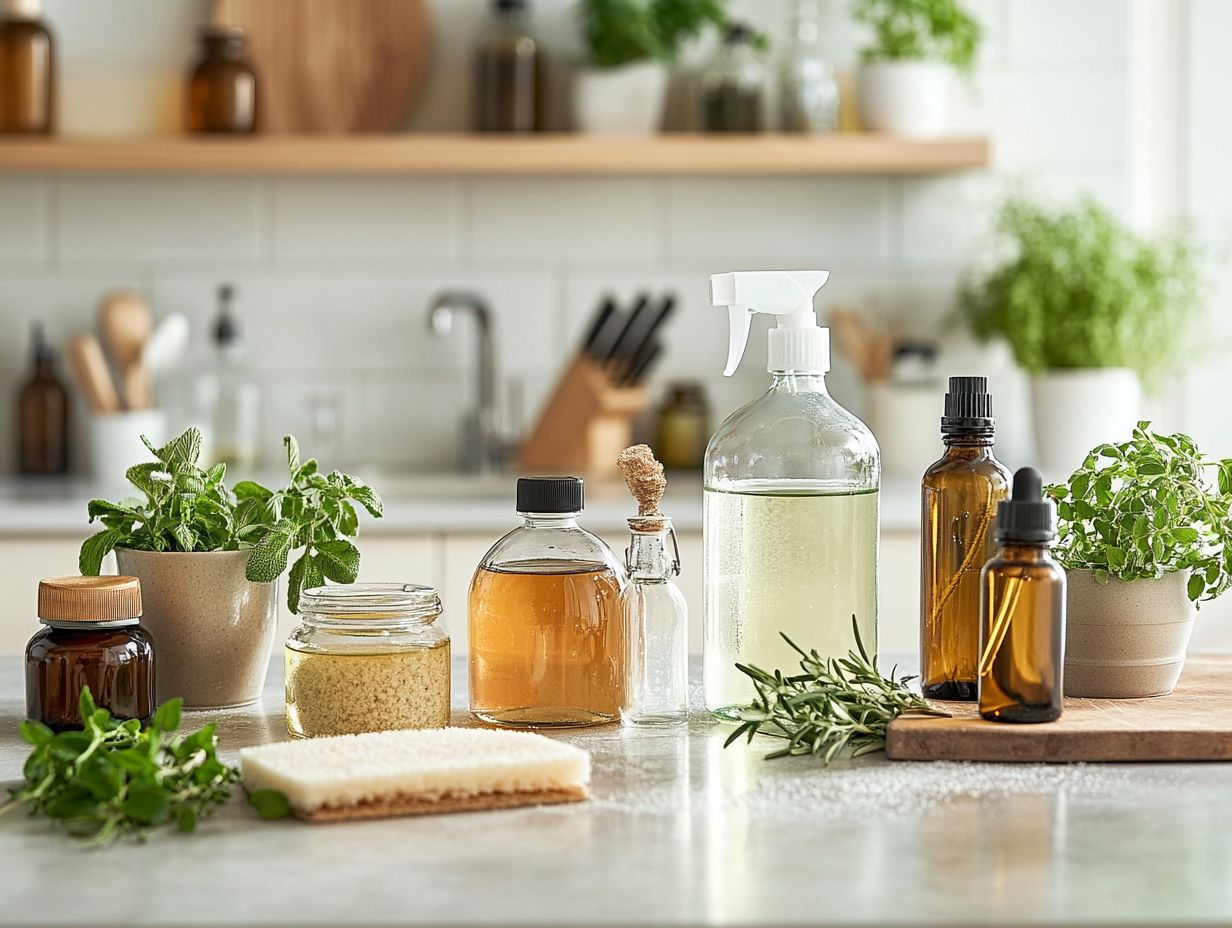
The advantages of using natural cleaners go beyond mere cleanliness. They embody a commitment to non-toxic cleaning that significantly reduces environmental impact and enhances indoor air quality. For health-conscious households, this makes them an exceptionally appealing choice.
By choosing natural alternatives crafted from ingredients like vinegar, baking soda, and essential oils, you can dramatically decrease your exposure to harmful chemicals often lurking in conventional cleaners. Many synthetic cleaning products release harmful chemicals that can affect your breathing, triggering respiratory issues and allergic reactions.
By opting for natural cleaners, you create a safer living space and contribute to sustainability efforts by minimizing plastic waste and utilizing ingredients that can break down naturally without harming the environment.
In practical terms, a simple vinegar solution can effortlessly cut through grease and eliminate odors, often outperforming its chemically laden counterparts all without leaving behind any toxic residues.
What Are the Common Chemicals Found in Conventional Cleaners?
Common chemicals found in conventional cleaners, such as bleach and ammonia, can pose significant health risks due to chemical exposure. They often lack the effective antibacterial properties that many natural cleaners provide.
Substances like phthalates and sulfates are frequently included in these products, raising valid concerns about their potential connections to respiratory issues and hormonal disruptions. It s essential to acknowledge that while traditional cleaners may promise a sparkling finish, they can often compromise indoor air quality and your overall health.
In contrast, natural cleaners, typically crafted from ingredients like vinegar, baking soda, and essential oils, present a safer alternative without the harmful side effects. By being aware of these substances, you can make more informed choices that promote a healthier living environment, prioritizing both cleanliness and your well-being.
How Can Natural Cleaners Be More Effective Than Chemical Cleaners?
Natural cleaners often outperform their chemical counterparts by leveraging the capabilities of ingredients like vinegar and essential oils. These ingredients effectively combat grime, bacteria, and odors without the harshness associated with many traditional cleaning products.
For tough kitchen jobs, consider a blend of baking soda and lemon juice. It can effortlessly tackle grease while serving as a safe alternative to conventional degreasers. In flu season, you can make a simple disinfectant with tea tree oil and water. This solution fights germs without leaving behind toxic fumes.
These natural cleaners allow for customization tailored to your needs, whether you’re looking for a gentle solution to wipe down countertops or a stronger mix to tackle stubborn bathroom mold. By embracing these natural alternatives, you enhance your cleaning effectiveness and foster a healthier living environment.
What Are Some Tips for Using Natural Cleaners in the Kitchen?
When you choose to use natural cleaners in your kitchen, employing effective tips can significantly enhance their performance. This ensures a safe and thorough cleaning experience on everything from countertops to appliances.
To optimize their effectiveness, grasp the right mix of cleaning ingredients. For instance, mixing one part vinegar with four parts water can effectively cut through grease while keeping harsh chemicals at bay.
The methods of application are just as important. Using a spray bottle allows for even distribution, while a microfiber cloth is perfect for gentle scrubbing. These small choices can yield major results.
Combining different natural cleaners, like baking soda and lemon juice, creates a powerful duo for deodorizing and fighting stains. This makes your cleaning efforts even more effective.
Establishing a regular cleaning ritual, perhaps designating specific days for deep cleaning with these methods, helps you maintain a pristine kitchen while embracing sustainable practices.
What Are the Environmental Benefits of Using Natural Cleaners?
The environmental benefits of using natural cleaners are truly remarkable. They promote sustainable cleaning practices that significantly reduce chemical runoff, minimize plastic waste, and support the health of ecosystems.
By choosing biodegradable alternatives, you diminish the harmful pollutants that enter our waterways. This choice plays a vital role in preserving soil quality and safeguarding wildlife habitats. These eco-friendly products are crafted to decompose naturally, ensuring they don t leave behind toxic residues that can linger for years.
Switching to natural cleaners not only protects your home but also helps our planet thrive! Opting for non-toxic cleaners fosters a safer indoor atmosphere, contributing to improved air quality for you and future generations. This deliberate commitment to environmentally responsible choices enables communities and inspires a collective shift toward a more sustainable and flourishing planet for all living beings.
Frequently Asked Questions
Ready to make the switch? Start today for a cleaner, healthier home!
What are the benefits of using natural cleaners in your kitchen?
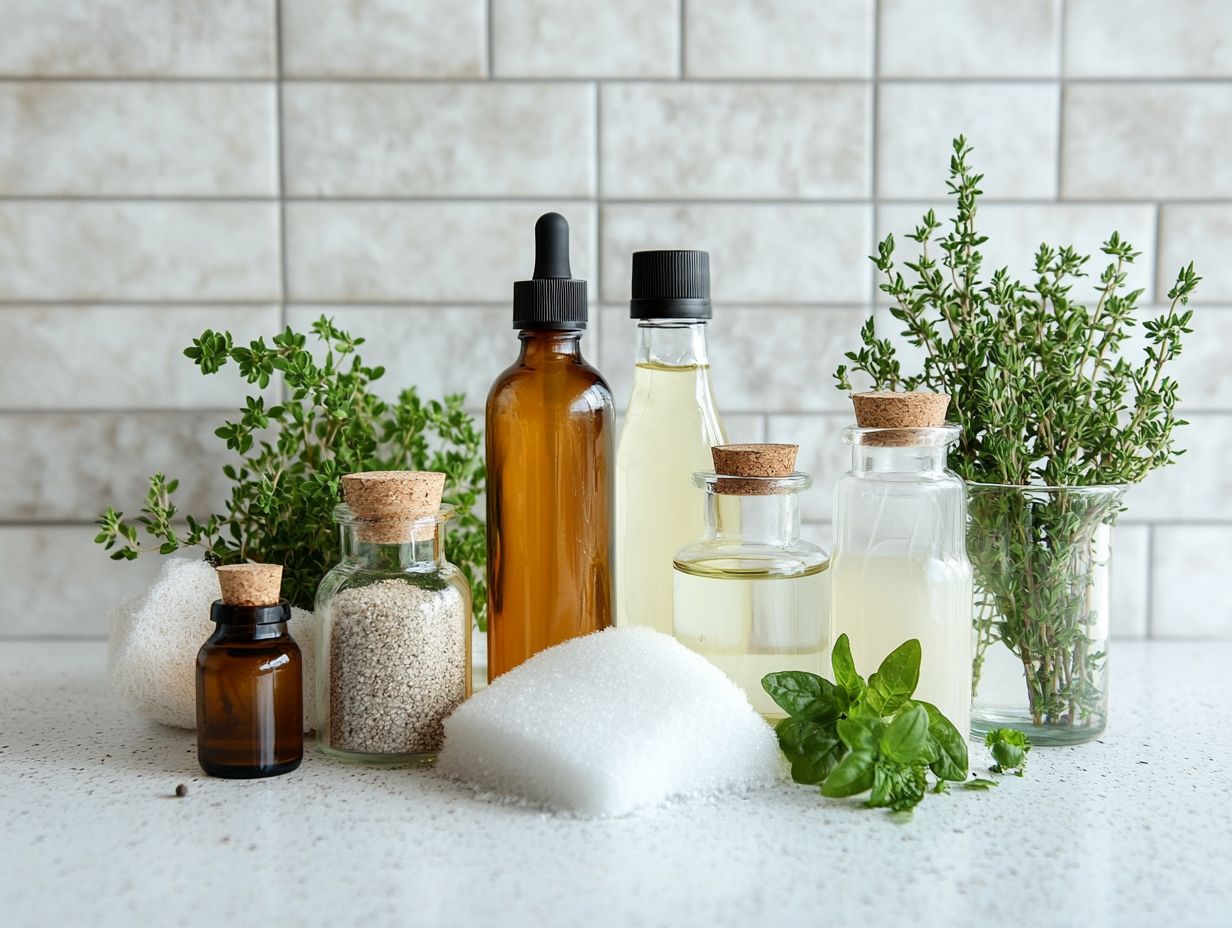
Using natural cleaners in your kitchen has numerous benefits. They reduce your exposure to harsh chemicals and are safer for food preparation areas.
Additionally, they are more environmentally friendly.
What are the best natural cleaners for disinfecting surfaces in your kitchen?
Some of the best natural cleaners for disinfecting surfaces in your kitchen include vinegar, lemon juice, and hydrogen peroxide. These ingredients can kill germs and are safe to use on food preparation surfaces.
How can I remove tough stains from my kitchen surfaces using natural cleaners?
To remove tough stains from your kitchen surfaces, use a mixture of baking soda and water or white vinegar and warm dish soap. You can even add a few drops of essential oils like tea tree or lavender to make a homemade cleaner.
These natural cleaners effectively break down and remove stubborn stains while minimizing chemical exposure.
Are natural cleaners safe to use around children and pets?
Yes! Natural cleaners, including DIY cleaners made with non-toxic kitchen ingredients, are generally safe to use around children and pets. However, always keep your cleaning products out of their reach to protect your loved ones from accidental exposure.
What are some natural cleaners that can be used to clean greasy surfaces in the kitchen?
Olive oil, baking soda, and lemon juice are all effective natural cleaners for removing grease from surfaces in your kitchen. You can mix them together in a spray bottle for easy application.
Adding essential oils like eucalyptus, rosemary, or lemongrass enhances the antibacterial properties of your cleaning solution.
Can you make your own natural cleaners at home?
Absolutely! Making your own natural cleaners at home is fun and simple. You can use common household ingredients like vinegar, baking soda, and lemon juice.
To boost their effectiveness, add herbs like thyme, clove, and cinnamon bark, or essential oils such as peppermint, bergamot, and melaleuca. There are many recipes and tutorials available online for creating effective and eco-friendly cleaning products.
These homemade cleaners are great for surface cleaning, floor cleaning, and even cleaning appliances, making them versatile household cleaners that reduce environmental impact.

